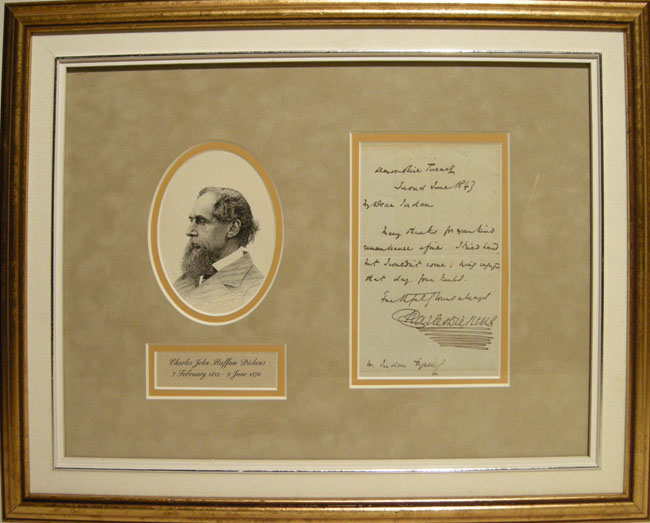 |
Dated Devonshire Terrace, 2 June 1843.
Text reads: My dear Jerdan / Many thanks for your kind/ remembrance of me. I tried hard, / but I couldn't come, being engaged / that day, four times. / Faithfully yours always / Charles Dickens.
Neatly signed at the conclusion with Dickens' characteristic signature, elaborately embellished with a paraph. In fine condition with mounting residue on the reverse, uniform overall toning from previous display, and a vertical fold through the “r” in “Charles.”
Written the year Dickens published A Christmas Carol and the year after the Dickens family relocation to Devonshire Terrace.
Charles John Huffam Dickens 7 February 1812 – 9 June 1870 English novelist and the author of such classics as Oliver Twist, A Tale of Two Cities, and David Copperfield. Despite humble beginnings Dickens rose by his own industry to become, firstly a reporter, and eventually the most popular English novelist of the Victorian era, and he remains popular, responsible for some of English literature's most iconic characters.
Many of his novels, with their recurrent concern for social reform, first appeared in magazines in serialized form, a popular format at the time. Unlike other authors who completed entire novels before serialization, Dickens often created the episodes as they were being serialized, punctuated by cliff-hangers to keep the public looking forward to the next installment. The continuing popularity of his novels and short stories is such that they have never gone out of print. His first serialized novel, The Pickwick Papers, appeared in March 1836. He continued to contribute to and edit journals throughout his literary career.
On 2 April 1836, he married Catherine Thomson Hogarth (1816 -1879), the daughter of George Hogarth, editor of the Evening Chronicle. They had ten children. In 1842, Dickens and his wife made his first trip to the United States and Canada. At this time Georgina Hogarth, another sister of Catherine, joined the Dickens household, now living at Devonshire Terrace, Marylebone, to care for the young family they had left behind. She remained with them as housekeeper, organizer, adviser and friend until her brother-in-law's death in 1870. |
 |
 |



